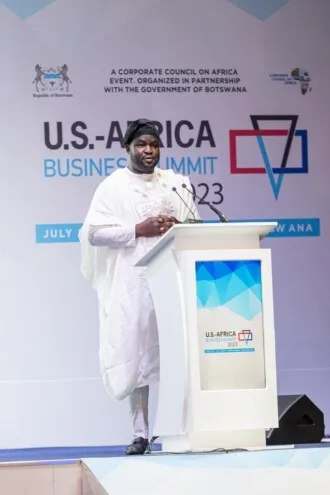Axxess CEO John Olajide spent this summer in Africa for the U.S.-Africa Business Summit in Gaborone, Botswana. As vice chair of the Corporate Council on Africa, the native Nigerian met with American and African political and business leaders to strengthen economic ties between the U.S. and Africa. Olajide founded and is CEO of one of the country’s largest home health technology companies, working with 9,000 organizations to serve five million patients worldwide. In addition to leadership at his alma mater, UT Dallas, he recently served as the chair of the Dallas Regional Chamber.
Olajide is the chair elect of the CCA, and next year the summit will be in Dallas. He sat down with D CEO to discuss his trip, the importance of the summit and council, and how his time in Africa connects to Axxess.
D CEO: Tell me about your trip to Africa.
JOHN OLAJIDE: “It was the highlight of my summer. It was the U.S.-Africa Business Summit, which is hosted by the Corporate Council on Africa. It is a meeting between businesses on the African continent and the largest American businesses that do business on the African continent. CCA members account for 85 percent of U.S. business on the continent. The Corporate Council on Africa is focused on how to help facilitate more business-to-business engagements and business-to-government engagements to promote more trade, investment partnerships, goodwill, and more. I’m an advocate for more trade, more investments, more partnerships, and collaboration between the U.S. and Africa, so it’s something that I’m passionate about.”
D CEO: Why is Africa so important?
OLAJIDE: “We discussed how the U.S. can continue to grow its engagement and how the African continent can continue to grow. I believe the future of the U.S. goes through Africa. There are many historical ties, and as you’re thinking about the new economies we’re building around, such as renewable energy and electric vehicles, the energy and natural minerals needed for all that is abundant on the African continent. There’s a meaningful way to engage that promotes greater commercial ties, trade, and investment.”
D CEO: How can the summit make a difference?
OLAJIDE: “Africa is underserved in many areas: infrastructure, technology, health care, education, everything. So, there are lots of ways that U.S. investments can make a difference. Those are opportunities to engage and incredible growth opportunities for U.S. business where maybe you’re seeing slower growth here in the U.S., but there are areas that are underserved. So those are growth opportunities.”
D CEO: Why do you say the future of the U.S. goes through Africa?
OLAJIDE: “Africa has the fastest growing population of young people in the world. By 2100, the most populated cities in the world will be on the African continent, as it has a very youthful population. Compared to what we’re seeing in other parts of the world with an aging population and the challenges of economic growth. You and I, in the working population, are doing a heavier lift than our parents have done. The question is, as the world is much more connected, how can we leverage the best of America and connect that with the best of what the African continent brings and provide opportunities for win-win solutions for economic prosperity on both sides? As we’re thinking about the economies of the future, a lot of the minerals and resources that are needed to power those economies reside in the African continent. Historically, some of those resources were just lifted in raw form and exported to the US, but the local governments are saying they want benefits locally that create jobs for their people. So that’s win-win for the US.. and Africa.”
D CEO: The summit is economically focused, but is there also a geopolitical angle?
OLAJIDE: “We’re way behind other players like China and Russia in influence in Africa. If we think about our future, the U.S. must engage in a thoughtful, strategic, and intentional manner. Before I got into doing all this work, I had done a lot of research on my own. I invested a lot of resources and spent time with our executive leaders and our policymakers on both sides to ask if there was a thoughtful, intentional strategy that the U.S. has toward African engagement. Unfortunately, a few years ago, there wasn’t any. But now, all of a sudden, it is thought to be a top priority.”
D CEO: How does all this connect to or impact your work with Axxess?
OLAJIDE: “We’re committed to helping increase access to quality healthcare services all over the world and leveraging our technology, so that’s our plan. We’re working on a direct market interest strategy in Africa to leverage the technology we have built to support healthcare services for people everywhere. We are already in lots of countries all over the world, and we’re working on marketing strategies to make sure we can increase access to quality health care in the remotest parts of the world in Africa, the US, and all corners of the world. The vision for how to use our technology is global, and we’re truly a global organization.”
D CEO: If Axxess is a technology company, what are the hurdles to growing your business into such underserved areas?
OLAJIDE: “I feel strongly that the future of healthcare is in the home, and there often aren’t enough resources in the US.. to build shiny new hospitals to serve more people. It’s no different in other parts of the world and all over the African continent. The resources just aren’t there to provide or build that type of healthcare delivery system. I don’t believe it’s the right system for the future. What’s unique about the African continent is that Africa leads the world in leapfrogging technologies and embracing new technologies to catch on. I’ll give you an example. In a country like Nigeria, with a population of over 20 million people just over a decade ago, they only had about 500,000 phone lines. About 15 years ago, with the advent of cell technology and mobile phones, they went from 500,000 phone lines to hundreds of millions of phones. Today, as far as cell phone penetration, Nigeria is a world leader per capita. They’re able to look at one or two cycles of technology ahead to be more connected. Similarly, as we’re thinking about leveraging Axxess’ technology to improve access to quality healthcare services globally, there are tremendous opportunities. We know there are resources to build a traditional healthcare delivery system, and we can leverage our technology to improve access to quality healthcare services for more people wherever they are.”
Author


Will Maddox
Will is the senior editor for D CEO magazine and the editor of D CEO Healthcare. He’s written about healthcare…



